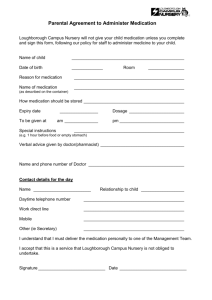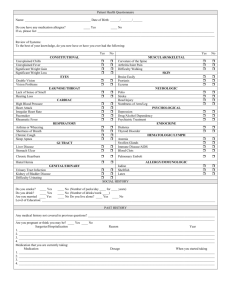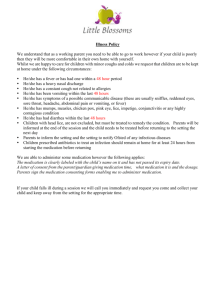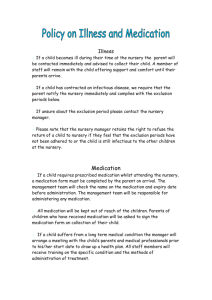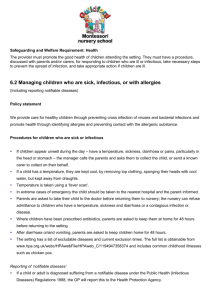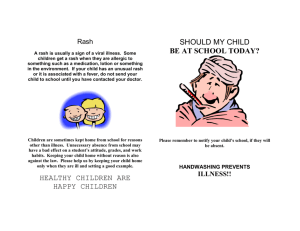First Aid and Emergency Treatments - our policy
advertisement
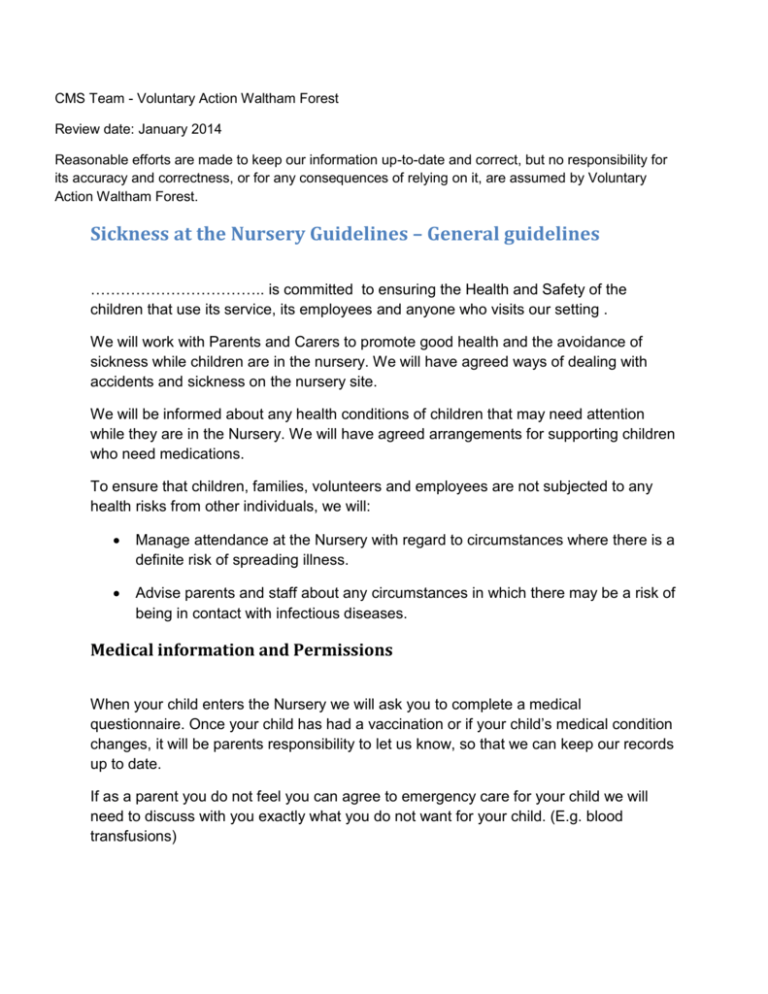
CMS Team - Voluntary Action Waltham Forest Review date: January 2014 Reasonable efforts are made to keep our information up-to-date and correct, but no responsibility for its accuracy and correctness, or for any consequences of relying on it, are assumed by Voluntary Action Waltham Forest. Sickness at the Nursery Guidelines – General guidelines …………………………….. is committed to ensuring the Health and Safety of the children that use its service, its employees and anyone who visits our setting . We will work with Parents and Carers to promote good health and the avoidance of sickness while children are in the nursery. We will have agreed ways of dealing with accidents and sickness on the nursery site. We will be informed about any health conditions of children that may need attention while they are in the Nursery. We will have agreed arrangements for supporting children who need medications. To ensure that children, families, volunteers and employees are not subjected to any health risks from other individuals, we will: Manage attendance at the Nursery with regard to circumstances where there is a definite risk of spreading illness. Advise parents and staff about any circumstances in which there may be a risk of being in contact with infectious diseases. Medical information and Permissions When your child enters the Nursery we will ask you to complete a medical questionnaire. Once your child has had a vaccination or if your child’s medical condition changes, it will be parents responsibility to let us know, so that we can keep our records up to date. If as a parent you do not feel you can agree to emergency care for your child we will need to discuss with you exactly what you do not want for your child. (E.g. blood transfusions) In some cases this may result in the Nursery needing to decide whether we can deliver childcare for your child as once we provide a place to a child we then have a duty of care towards them. Parents / carers will be notified of their child’s injury/illness and will be required to sign an accident / incident form at all times. For any major illness or injury parents will be contacted immediately. First Aid and Emergency Treatments - our policy All nursery staff are trained and qualified in Paediatric First Aid, which is renewed when required. In cases of emergency, basic first aid will be provided by our trained members of staff. In the case of a serious accidents/incident emergency medical care will be sought from appropriately trained professionals and parents will be contacted immediately. Appropriate first aid must be administered for all minor accidents, and the child will be kept under constant supervision. Major Accidents Major accidents e.g. severe head injuries, fractures and difficulties in breathing, vomiting and unusual drowsiness or where the child appears to be in pain and we do not know what is wrong. The child must be taken to the accident and emergency department without delay, accompanied by a member of staff until the parent is able to arrive at the hospital. Medication policy Parents must complete a medicine form when your child is on medication, and countersigned when you collect your child to confirm that the medication has been given. Long term medication For those children who require medication it is the parent/carer responsibility to ensure that the nursery has possession of any such medication with clear instructions for administration and storage. We may ask to see a copy of the medical prescription for the medication. Emergency medication Emergency medication is any medication which must be administered in an emergency situation, for example, Epi-pens and asthma pumps in the case of severe allergic reaction or asthma attacks. It is the parent/carer responsibility to ensure that the nursery has possession of any such medication with clear instructions for administration and storage. Non Prescription Medicines The nursery does not normally administer non prescribed medication to the children in our care except in the following two instances. ‘One off’ Dose’s of Medication 1) The nursery operates a ‘one off’ dose system which means that fever reducing/pain relieving medication will be administered to children in the case of sudden and unexpected raised temperature, for example, as seen in the onset of the common cold. 2) Children who are teething will be given fever reducing/pain relieving medication or teething gel when prior consent has been obtained from the parent/carer. We do not administer anti-biotics, cough medication or regular doses of pain relieving/fever reducing medication. If children are unwell enough to require these we ask you to consider if they are well enough to attend the setting. The nursery staff will also ensure that they have sufficient information and knowledge in order to care for children with long-term/specific health needs and acknowledge that this may involve taking advice from parents and medical professionals. All medication which is not prescribed by a doctor, dentist, nurse or pharmacist will not be administered to children except in the case of teething and ‘one off’ dose situations. The nursery will not accept medicines that are not in their original containers and packaging. All medication will only be administered in adherence to the prescriber’s instructions or in accordance with the manufacturer’s guidelines. The medication must also be provided with its original storage instructions. All medication in our possession is stored in a locked medication cupboard except in the instance where medication must be stored in a fridge. All medication is clearly labelled with the child’s name and weekly medication cupboard checks ensure that medication is clearly labelled, stored correctly and in date. Before any medication can be administered prior written consent must be obtained from the parent/carer by their completing and signing a Medication Administration Form and/or ‘one off’ dose consent form. Consent for the administration of all medicines must be given beforehand. Parent/carers will be required to sign their child’s medication form to confirm that they have been informed that medication has been given. Infectious diseases In the case where children are ill parents should keep their child at home until they have recovered. We do not provide care for children who are unwell, have a temperature, vomiting, diarrhoea or who have an infectious disease. Parents/carers will be informed if an infectious disease is confirmed within the setting. Children with mild coughs and sneezes are welcome into the setting provided they do not have a temperature, are not distressed by their symptoms and do not pose a serious threat to the other children’s health and well-being. If the child’s condition deteriorates whilst in our care we will contact the parent/carer and ask them to take their child home. If the parent/carer has signed a consent form for the ‘one off’ dose we will administer this if it is appropriate to do so. Sunbeam/Sugar Plum Tree Nursery will contact the child’s GP, NHS Direct or the Emergency Services for advice or treatment if the child’s condition causes us concern or their condition deteriorates significantly. We will then endeavour to contact the parent/carer immediately. If children are infectious children should be kept at home until the recommended exclusion period has past or until treatment has been established as advised by a qualified health/medical professional. Parents should refer to the attached Exclusion Advice Sheet. With regards to diarrhoea parents/carers will be asked to come and collect their child after two episodes of diarrhoea per day whilst in our care. Children who have vomited on two occasions per day whilst in the setting will also be sent home. When children have been sent home due to diarrhoea or vomiting children should be kept at home at least 48 hours or until the diarrhoea or vomiting has stopped and the child is well after the specified period of time. Children who have a raised temperature will also be sent home. Parent/carers are required to keep children home for at least 24hrs after the temperature has stopped. The local authority’s medical officer for environmental health will be notified of any infectious diseases that a qualified medical person considers notifiable as outlined in the Infectious Diseases (notification) Act 1989. OFSTED will also be informed. Children taken sick at the Nursery Guidance for Parents Disease/Illness Exclusion Period Chicken Pox 5 days from onset of rash German Measles (Rubella)* 5 days from onset of rash Hand Foot and Mouth Until disease has been fully treated Impetigo Until sores are crusted or healed Measles* 5 days from the onset of rash Ring Worm Until treatment commenced (if on exposed areas such as hands or face must covered by dressing) Scarlet Fever 5 days after commencing anti-biotics Warts and Verrucae No exclusion required- but must be covered if on feet Diarrhoea and Vomiting 48 hours following last episode of diarrhoea or vomiting Conjunctivitis Until treated and eyes are clear Head Lice No exclusion usually needed provided treatment is carried out. However, in cases of heavy infestation child will be excluded until fully treated to prevent head lice spreading Mumps* 5 days from onset of swollen glands Tonsillitis None- but child must be seen by GP Whooping Cough* 5 days from the commencement of anti-biotic treatment or 21 days from onset of illness if no anti-biotic treatment prescribed Influenza (Flu) Until fully recovered Athletes Foot No exclusion period required- but socks must be worn at all times while in setting Cold Sores (Herpes Simplex) No exclusion period required Scabies After first treatment Fifth Disease/Slapped Cheek Syndrome No exclusion period required Shingles Excluded only if rash is weeping and cannot be covered Thread Worm No exclusion period required Raised Temperature 24 hours since the last episode of raised temperature * Notifiable Disease- please refer to medication and unwell child policy Parents/carers should be aware that the above exclusion information may change and the Nursery will follow the guidelines issued by the Department for Health/Medical Practitioner regarding the above diseases or any others not listed. Consent for ‘One Off’ Dose Administration I would like my child__________________________________ D.O.B_______________ to be given a ‘one-off’ dose of the age appropriate pain relieving/temperature reducing medication I have provided in the case of sudden and unexpected high temperature. I understand; That this is strictly a ‘one off’ dose and will not be given to my child in the case of any longer-term condition that requires regular doses of the medication I have provided. In which case I will refer to the Medication and Unwell Child Policy. That in the event that the ‘one off’ dose is required staff will attempt to contact me to inform me that my child is unwell and to gain verbal consent to give the dose whilst waiting for me to come and collect my child. If I cannot be contacted I understand that staff will take this signed document as consent given and will administer the dose. That on collecting my child I will be required to sign a medication record sheet to confirm that I have been informed that the dose has been administered. That as the person with parental responsibility I have provided a medication which is suitable for my child to take in the event of sudden and unexpected high temperature. I confirm that to my knowledge there is no known reason why my child cannot be given this medication and accept that it is my responsibility to inform Sunbeam/Sugar Plum Tree should my child’s suitability change or in the event that any further health issues arise. In the case where children become unwell and their symptoms cause concern Sunbeam/Sugar Plum Tree reserve the right to contact my child’s GP, NHS Direct or the Emergency Services for advice or treatment. In such situations Sunbeam/Sugar Plum Tree Nursery will endeavour to inform me immediately. I have; 1. Provided an age appropriate pain relieving/temperature reducing medication that is clearly labelled with my child’s name. 2. Handed over the medication into the possession of the Nursery in its original packaging and with its original instructions for safe storage and dose administration i.e how much to be given and how often. 3. Checked the expiry date and have ensured that the product is not out of date. I declare that I have parental responsibility for the below named child. By signing this form I give ……………………………………. permission to administer the below named medication in the instances listed above and in accordance with the products instructions for administration. I accept that it is my responsibility to keep ………………………………………… up to date with any changes my child’s suitability to be given the medication I have provided. I therefore declare that all information given is true and accurate at the time of signing. PARENTS SIGNATURE______________________________PRINT NAME_______________________ RELATIONSHIP TO CHILD______________________________ DATE___________________________ CHILD’S NAME__________________________________________________ D.O.B______________ NAME OF MEDICATION_____________________________________ EXPIRY DATE______________ MANAGERS SIGNATURE____________________________________________DATE__________ ___ Guidance for Parents Below is a list of the most common communicable diseases that young children experience. The following information has been produced as a guideline for you but if you are concerned about your child and unable to get an appointment with your G.P. please consult a Pharmacist or NHS direct. If your child is suffering from any of the following infectious illnesses please let a member of staff know, or contact the nursery on (01603) 773121. Once informed we will place a notice on the front door of the nursery to ensure that everyone has been notified of any communicable diseases in the nursery. 1.Diarrhoea and/or Vomiting Signs and Symptoms As diarrhoea and vomiting is infectious please do not bring your child back to the Nursery until he/she has been clear of these symptoms for 48 hours. This is a national policy from OFSTED regarding the care of children under the age of five years. 2.Measles Signs and Symptoms Early symptoms of measles may include a running nose, watery eyes, high temperature and a cough. Red spots with a white centre may also be seen on the inside of the mouth, behind the ears and on the face and limbs. General Medical Advice As measles is infectious until five days after the appearance of the rash, please exclude your child from Nursery until the rash has disappeared. 3.Chicken Pox Signs and Symptoms Children who suffer with Chicken Pox can display a wide range of symptoms,but usually they will appear fretful, suffer with a loss of appetite and have ahigh temperature. A rash will appearon the trunk, face or limbs, and then small blisters will form which may cause an irritation. General Medical Advice Please provide your child with lots of fluids to help them reduce their temperature. You may find calamine lotion soothes the irritation. Parents Action Chicken pox is infectious for up to five days before and not more than fivedays after the appearance of the last spots. To reduce the risk to others your child must be excluded from Nursery for up to five days after the appearance of the spots, or until the spots are dry. 4.Mumps Signs and Symptoms Early symptoms of mumps can include swollen glands on one or both sides of the face, sore throat and a loss of appetite. Your child may also experience difficulty in swallowing. General Medical Advice Mumps can be infectious for up to one week after the facial swelling appears. Parents Action Please exclude your child from Nursery for five days from the onset of swelling Conjunctivitis This is an infection of the eye or eyes and is generally caused by bacteria, which is spread by hand to eye contact, or by viruses associated with a cold. The symptoms include redness, discomfort and discharge from the affected eye. Attention to scrupulous hand hygiene can prevent spreading of the infection. Chicken Pox This is a common infectious disease, which is characterised by a rash (pustules) and slight fever. The disease is spread by airborne droplets and can be infectious 21 days before rash appears up until a week after, or until the rash has scabbed and dried. Gastroenteritis (D&V) This is an inflammation of the stomach and intestines caused by any of a variety of bacteria, viruses and other small organisms that have contaminated food or water. Symptoms include appetite loss, nausea, vomiting, cramps and diarrhoea. The affected individual can spread the illness when attention is not paid to personal hygiene, including hand washing. Measles This is highly infectious characterised by a rash and fever. It is spread by airborne droplets of nasal secretions. Infected children can transmit the virus during the 8 to 14 day incubation period and up to one week after the onset of symptoms. Mumps This is a viral illness spread by airborne droplets. The chief symptom is inflammation and swelling of the parotid glands just inside the angle of the jaw. This disease can be spread to others for about a week before and up to two weeks after the symptoms appear. Scabies This is a skin infestation caused by mites, which burrow into the skin. The mite’s burrow can be seen on the skin as scaly swellings usually between the fingers and on the wrist. The infestation causes itching. Scabies is highly contagious during close physical contact. Specific treatment is required and 24 hours after treatment individual can attend nursery. Impetigo Impetigo is highly contagious. Sensible hygiene precautions prevent the spread of bacteria and reduce the risk of other people catching it. Impetigo has a characteristic look to it, with inflamed red lumps leaking pus to form thick yellow crusts. It spreads very quickly. It is common on the hands and around the mouth and nose. Sever infections can affect the whole body. To prevent the impetigo returning, keep skin clean and ensure than any condition causing broken skin (e.g. eczema, nappy rash) is treated early. Whooping Cough This is caused by bacteria, which is spread by airborne droplets. Child is seen as infectious when presenting with cough (which can have a characteristic whoop), sneezing, nasal discharge, fever and sore eyes. Hand, Foot & Mouth Hand, foot and mouth disease is a common infectious disease, caused by coxsackie virus. It is a disease mainly of children, especially of toddlers, and is very serious. Hand, foot and mouth disease is very contagious (easily spread) and is common in children under 10 years of age. However, adolescents and adults can also be affected. It features many small blisters (vesicles) in the mouth and on the palms of the hands and the soles of the feet. These may also appear on other parts of the body. There may be some difficulty in swallowing, a slight fever and occasionally vomiting. Scarlet Fever The disease often starts with a sore throat or a skin infection about 12 hours before the main symptoms appear. The characteristic symptom of scarlet fever is a fine rash on the body that feels like sandpaper to touch. It may start in one place, but soon spreads to many parts of the body, commonly the neck, chest, elbows, inner thighs and groin. The rash does not normally spread to the face, but the cheeks become flushed and the area just around the mouth stays quite pale. The overall impression of someone with a flushed, red face is what gives the disease its name. Other symptoms include:- high temperature, headache, white coating on tongue (which peels a few days later, leaving the tongue looking red and swollen – known as strawberry tongue), and a general feeling of malaise. Scarlet Fever is infectious. It is spread through close physical contact ocontact with the mucus from an infected person. Very severe infections may cause high fever, feeling sick and vomiting. Scarlet Fever is a notifiable disease. This means that your doctor must report any cases to the local health authorities, so they can monitor the spread of the disease. Tonsilitis Tonsilitis, whether due to a virus or bacteria, is spread from person to person by saliva, hand contact or airborne droplets. The incubation period between picking up the infection, and its onset is usually between 2 and 4 days. Children may have a sore throat, pain on swallowing, headache, a feeling of malaise, fever, which may be very high in young children. Constipation and earache are also common. The tongue may well be furry and breath unpleasant. It may be difficult to open mouth and speech may be thickened. Tonsillitis caused be streptococcal bacteria responds well to antibiotic treatment. This should always be given if the infection is streptococcal. Antibiotic Treatment/Medicine Children who are prescribed antibiotic medicine must refrain from Nursery for 24 hours after the first initial dose. Antibiotics have the potential to cause allergic reaction thus necessitating close observation by parent/guardian. GUIDELINES FOR ILLNESSES WHERE CHILDREN ARE ASKED TO REFRAIN FROM ATTENDING NURSERY MUMPS 10 days from outset of swollen glands. 24 hours after full course of treatment/until infection has cleared. SCABIES Children with impetigo should be kept from nursery until spots have IMPETIGO dried up and no longer leaking fluid. With use of antibiotics, impetigo SKIN DISORDERS usually heals within a week. WHOOPING COUGH 5 days from commencing antibiotic treatment. DIARRHOEA After a minimum of 3 soiled nappies, exclusion 48 hours. VOMITTING After 48 hours from onset. HIGH TEMPERATURE If we cannot maintain a safe temperature, a child will need to be collected for his/her own safety. HAND, FOOT & MOUTH There is a short four- to six-day incubation period between exposure and development of initial symptoms (fever and malaise). A person is most contagious during the first week of illness. SCARLET FEVER Common treatment is a short course of antibiotics. Paracetamol can be used to bring down the fever. Children should be excluded for five days after the start of treatment, and kept away from other children as much as possible. TONSILITIS Antibiotic treatment required, exclusion until infection clear. ANTIBIOTIC MEDICINE 24 hrs exclusion after initial dose of antibiotic REVIEW AND EVALUATION This policy was agreed at a meeting of ……………………… Management Committee Held on ……………………………….. To be reviewed on ……………………………….. Signed ……………………………………………………………… Chair of Management Committee
